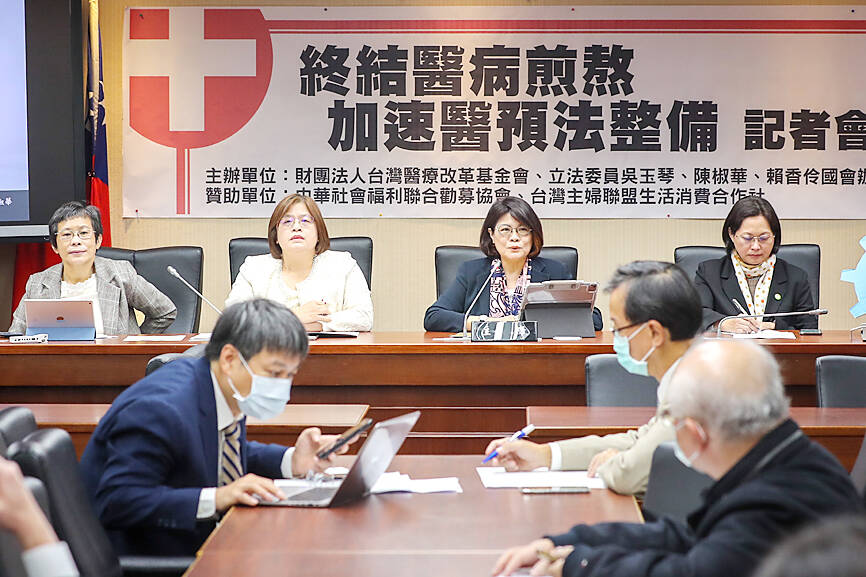The Taiwan Healthcare Reform Foundation and legislators yesterday urged the government to enact the Medical Accident Prevention and Dispute Settlement Act (醫療事故預防及爭議處理法), which was passed in May, but will not take effect until 2024.
The foundation invited Democratic Progressive Party Legislator Wu Yu-chin (吳玉琴), Taiwan People’s Party Legislator Lai Hsiang-ling (賴香伶) and New Power Party Legislator Chen Jiau-hua (陳椒華) at a news conference at the Legislative Yuan in Taipei to push for the act’s implementation.
Foundation chairperson Joanne Liu (劉淑瓊) said that the legislative process took more than a decade before the bill was finally passed in May, which is expected to reduce conflicts between doctors and patients.

Photo: CNA
Many hope that the legislation would be enacted within a year after it was proclaimed, but because there was not enough time to complete preparatory works, including amending supporting laws, system development, selecting members for a committee of experts, and education and training, enactment is expected to be delayed to 2024, the foundation said.
As medical accidents are a heavy burden to both doctors and patients, the act stipulates that healthcare facilities must set up a medical accident care task force, and the government should fund a third-party legal entity to conduct professional assessments, Liu said.
There are still challenges, including whether patients and a healthcare faculty’s care task force can develop mutual trust, smaller hospitals or clinics lacking care capacity and a handling mechanism, and the difficulty ascertaining the truth if the third-party legal entity is not given independent investigative powers, she said.
The government should accelerate revision of supporting laws and establishment of non-litigation medical dispute settlement mechanisms that the public can trust and use, she said, urging the government to step up preparatory works and enactment to help relieve tension between doctors and patients.
Wu said when the lawmakers were reviewing the act, Deputy Minister of Health and Welfare Shih Chung-liang (石崇良) had said that there are seven supporting laws associated with the act, so its enactment was likely postponed because of budget allocation problems.
Wu did not agree, saying there have been trial runs of the act, so budget allocation should not be a reason to postpone it, as she called on the government to step up its preparations for enactment.

Alain Robert, known as the "French Spider-Man," praised Alex Honnold as exceptionally well-prepared after the US climber completed a free solo ascent of Taipei 101 yesterday. Robert said Honnold's ascent of the 508m-tall skyscraper in just more than one-and-a-half hours without using safety ropes or equipment was a remarkable achievement. "This is my life," he said in an interview conducted in French, adding that he liked the feeling of being "on the edge of danger." The 63-year-old Frenchman climbed Taipei 101 using ropes in December 2004, taking about four hours to reach the top. On a one-to-10 scale of difficulty, Robert said Taipei 101

Nipah virus infection is to be officially listed as a category 5 notifiable infectious disease in Taiwan in March, while clinical treatment guidelines are being formulated, the Centers for Disease Control (CDC) said yesterday. With Nipah infections being reported in other countries and considering its relatively high fatality rate, the centers on Jan. 16 announced that it would be listed as a notifiable infectious disease to bolster the nation’s systematic early warning system and increase public awareness, the CDC said. Bangladesh reported four fatal cases last year in separate districts, with three linked to raw date palm sap consumption, CDC Epidemic Intelligence

US climber Alex Honnold left Taiwan this morning a day after completing a free-solo ascent of Taipei 101, a feat that drew cheers from onlookers and gained widespread international attention. Honnold yesterday scaled the 101-story skyscraper without a rope or safety harness. The climb — the highest urban free-solo ascent ever attempted — took just more than 90 minutes and was streamed live on Netflix. It was covered by major international news outlets including CNN, the New York Times, the Guardian and the Wall Street Journal. As Honnold prepared to leave Taiwan today, he attracted a crowd when he and his wife, Sanni,

Taiwanese and US defense groups are collaborating to introduce deployable, semi-autonomous manufacturing systems for drones and components in a boost to the nation’s supply chain resilience. Taiwan’s G-Tech Optroelectronics Corp subsidiary GTOC and the US’ Aerkomm Inc on Friday announced an agreement with fellow US-based Firestorm Lab to adopt the latter’s xCell, a technology featuring 3D printers fitted in 6.1m container units. The systems enable aerial platforms and parts to be produced in high volumes from dispersed nodes capable of rapid redeployment, to minimize the risk of enemy strikes and to meet field requirements, they said. Firestorm chief technology officer Ian Muceus said